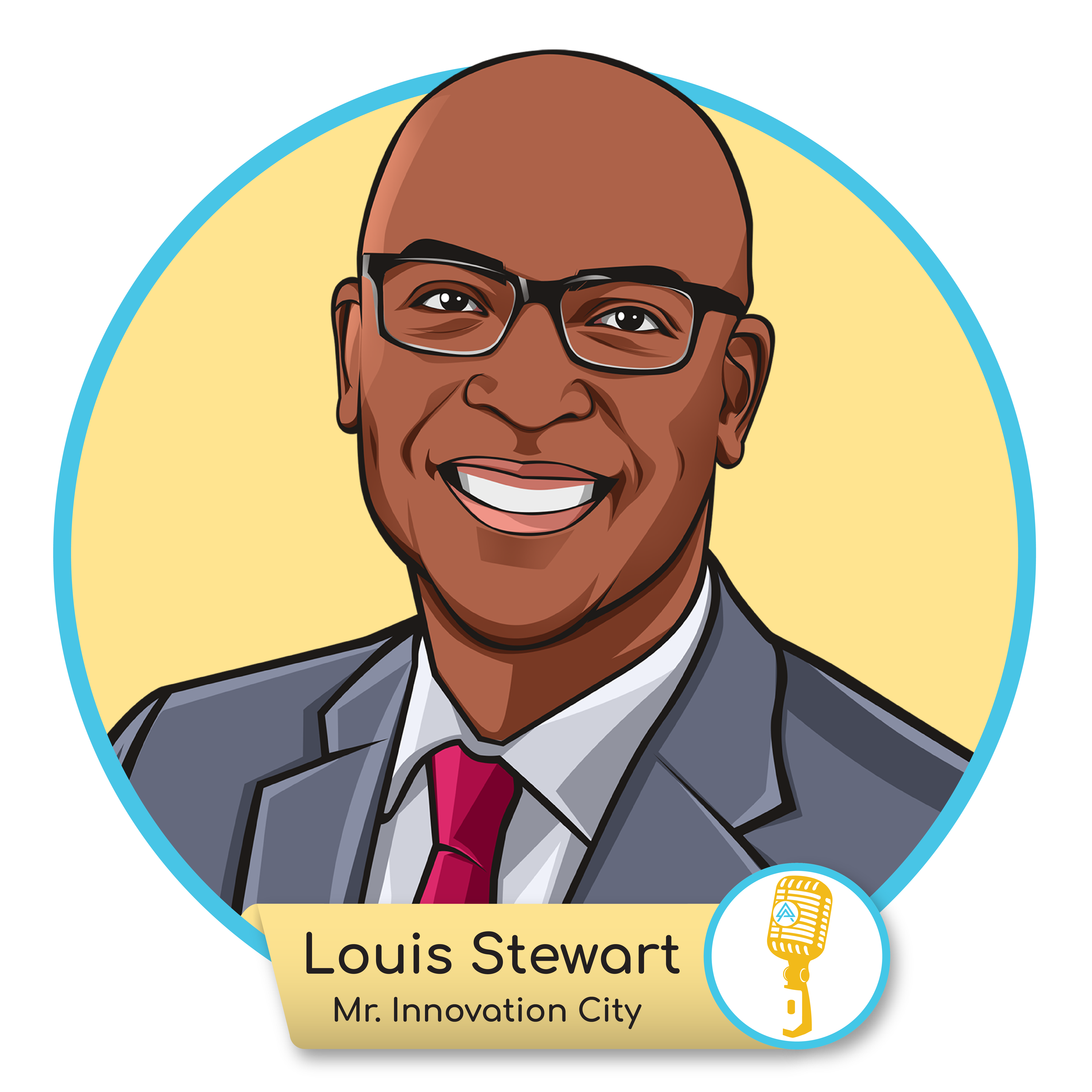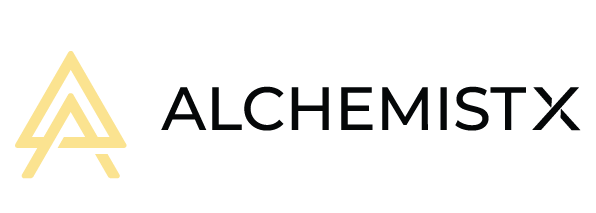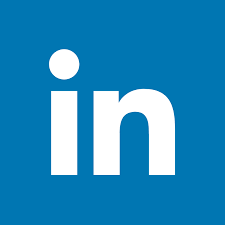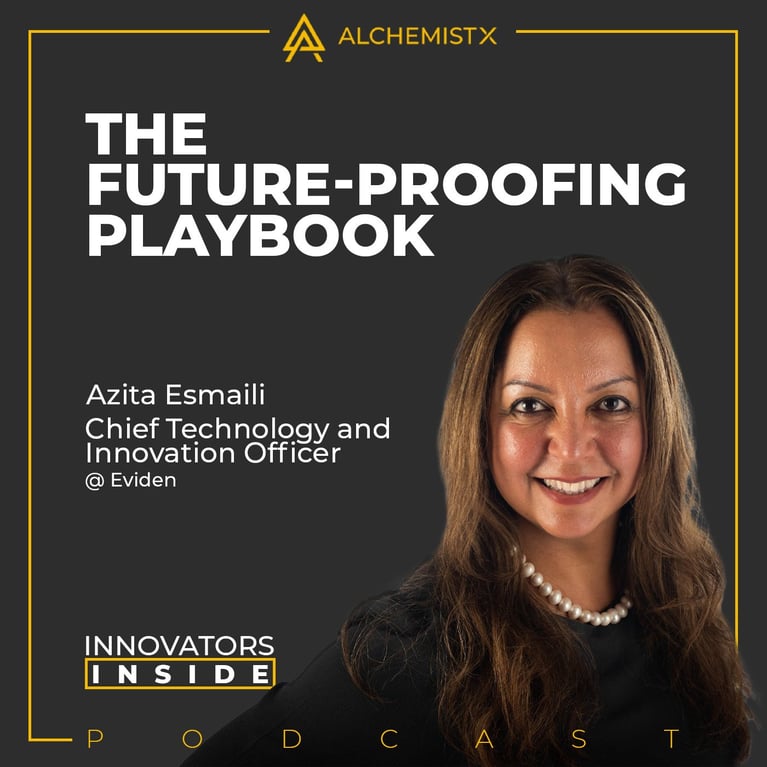Azita Esmaili, Chief Technology and Innovation Officer at Eviden explores the dynamic interplay between AI, innovation management, and future-proofing organizations.

AlchemistX: Innovators Inside
E.03 - Louis Stewart: Mr. Innovation City
Published on
February 3, 2021
"Everybody has different needs in order to be successful. So trust your gut. If a door opens, give it a shot. Go ahead and take a look inside the door and see if there's something in there that you can learn from." - Louis Stewart
Tags:
Show Notes
Rachel Chalmers:
Today I'm thrilled to welcome Louis Stewart to the show. Louis is currently the Head of Strategic Initiatives for NVIDIA's developer ecosystem. NVIDIA of course being the maker of legendary GPU’s and the enabler of our current golden age of video games. Prior to NVIDIA, Lewis was the city of Sacramento's first Chief Innovation Officer, charged with promoting and driving long-term economic growth and job creation through Innovation. Before that he spent seven years as California’s Deputy Director of Innovation and Entrepreneurship in the Governor's Office of Business and Economic Development.
He grew up in France and Italy, played professional basketball in Peru and Belgium, and has a degree from Santa Clara University. Mr. Stewart, thank you so much for being on the show.
Louis Stewart:
It’s an honor. Thanks for having me Rachel. This is going to be a blast!
Rachel Chalmers:
I would love to start with Sacramento. What does it mean to be the Chief Innovation Officer for an entire city?
Louis Stewart:
So that's an excellent question and it actually took a while to figure out because all of the Chief Innovation Officers that I was looking at prior to me in other cities. They were doing things very differently. Some were measuring metrics just for City Hall, some for specific business units, and some had charge of the IT infrastructure. It was very IT focused.
For me, coming from the Governor's Office of Business and Economic Development, it meant trying to bring Innovation that would lead to economic development and job growth in Sacramento.
When you look at that for a whole entire city that is also the state capital; and it’s really only known as a government town, that meant creating a whole new narrative around why Sacramento was an Innovation Hub. And why Sacramento mattered to Innovation globally and that is why it was a heavy lift.
Rachel Chalmers:
And it’s in a really interesting position, literally. These days it's directly between Silicon Valley and Lake Tahoe where all of the wealthy engineers moved.
Louis Stewart:
Right?
Rachel Chalmers:
Yet it has been considered a little bit of a Backwater for most of the history of Silicon Valley. How do you address that? Now it's within commuting distance thanks to the Capitol Corridor.
Louis Stewart:
I think the biggest thing that we did was change the narrative and become, what we call the Living Laboratory. Any business that wanted to try something that wanted to demonstrate their “wears” and see if something would work; we invited them to come to Sacramento. There, they would see if self-driving cars would operate on our streets. If it was an IOT solution, we work with our Public Works team to get things set up. We did some work around AI and crosswalks. We did a lot of stuff just to try and a lot of that was because being the state capital, we had all the legislators literally a mile away from us. We had regulatory bodies within a five mile radius from City Hall.
So at any point in time, we gave access to businesses, to legislature, and to Regulators that they necessarily didn't have. For us it was one phone call and we could call folks and get people to show up and get people to conversations. The Industry really appreciated them, especially startups.
That's what Sacramento was desperately needing. A shot in the arm to support its own startup ecosystem by getting other dollars, other investment, and other startups coming to look at Sacramento as a place to do business.
Rachel Chalmers:
And then Stanford and Berkeley are such huge engines for Silicon Valley. Did you get to work with the tertiary institutions like UC Davis?
Louis Stewart:
I think one of the biggest things that we tried to do was set up the triple helix out of some research at Stanford. Government. Industry. Academia. We have government all day. With academia, we have the home of the California Community College systems in Sacramento. And then we had UC Davis 20 minutes away. If there's no traffic!
So you bring the strength of those institutions for what they currently offer, and you bring them into new conversations that we're having around cybersecurity - that we're having around life science - that we’re having around some of these other technology areas. All of a sudden you're talking peer-to-peer with Berkeley, Stanford, MIT and with whoever. Because now we're actually in the Innovation conversation. It really was a global conversation because people were coming to Sacramento to visit the Capitol. They wanted to come talk to us about the innovation that we were doing.
So bringing those universities alongside and bringing the community colleges, which made it really easy for us to discuss adopting a new curriculum for some of these new technologies. It is a fantastic partnership.
Rachel Chalmers:
A little bit of home state pride there. For our listeners who aren't in California, our community colleges are really phenomenal in that they're academically, extremely rigorous. And of course UC Davis is one of the world centers of Veterinary and Biological Science. It's a Powerhouse.
Louis Stewart:
Absolutely.
Rachel Chalmers:
How is that work different from what you're doing now at NVIDIA and are there any ways in which the two roles are similar?
Louis Stewart:
The most obvious way that it is different is that things in the industry move a whole lot faster than the government. So when something needs to get done, it just gets done on the industry side. A couple of approvals and then you're on your way. So the speed at which business happens is crazy. For my first two weeks at NVIDIA, it felt like I was literally drinking from three fire hoses. I was just trying to fully understand what the company did. Because I knew of the video game side and I knew that they were into self-driving cars, but then I started looking under the hood and found healthcare, cybersecurity, and all this other stuff. Which was cool because those were the languages that I was speaking in Sacramento.
So trying to bring light to a lot of that work that we were doing in Sacramento, and the cybersecurity piece was a carryover from the Governor's Office. Which is where I was one of the founding members of the Statewide cybersecurity competition that we have in California for high school students. So then all of a sudden there's some familiar words being used and NVIDIA.
But the biggest thing now is to develop ecosystems. That's what I've been doing for the past 13 years with the state and with the city. In this case, it's still working with academics and with industry. The piece that I haven't tapped into just yet is the government side, and trying to make sure that legislation is friendly to the future that we see at NVIDIA. But then other companies are actually doing on the tech side. All of it with an undertone of some kind of social equity.
In Sacramento it was trying to make sure that underrepresented communities were aware of the innovations that we're coming. It's a little bit of the same here. But at NVIDIA, it's really about creating economic mobility in the ecosystems that I’m building. We’re primarily focused on historically black universities, Hispanic-serving institutions, and other minority serving institutions. My remit is more Global in nature. Which is dealing with Latin America, dealing with Africa, dealing with the EU; and just looking for pockets of developers out there or want-to-be developers, that are looking for the latest and greatest tech - just trying to bring them into our system.
Everything's not necessarily about hiring everybody, but creating economic mobility and business development opportunities by getting people tech prepared.
Rachel Chalmers:
That sounds really fun.
Louis Stewart:
It's a lot.
Rachel Chalmers:
Also really challenging. The position a lot of us in Corporate Innovation find ourselves in is trying to arbitrate between those two different rates of development; the very first world of technology and the much slower moving worlds of large corporations or governments.
How are you finding that balance? I know you're still finding your feet at NVIDIA. But how do you perform that impedance matching between the two rates of change?
Louis Stewart:
It's interesting because of leveraging what I did at the state and at the city, it's a delicate dance. The work that I'm trying to do with the government is really going to be secondary by first building the relationships with universities, with professional organizations, and with Collegiate organizations. So, when we finally get ready to go talk to the legislature, especially here in California, we’d have examples of work that we are actually actively doing. So, if we're working with Hispanic serving institutions in California, we want to make sure that we team up with the legislature to let them know what we're doing. That's going to be the same thing with historically black colleges and universities out east and down south.
We’re really trying to build the story of NVIDIA beyond the hardware and video game users. Back to Sacramento, we had to build a story. NVIDIA has a story. Most people just know the video game side of the story.
Now we're trying to do the talent development side of the story. Especially now with the speed of the digital information age and displacement because of the pandemic. Workforce development and talent development are going to be key to getting people back online and getting people access. So we want to be part of that conversation.
Rachel Chalmers:
That touches on something really deep. I was actually telling a team of my corporate intrapreneurs in my current program this morning that their technical skills are great, important, and necessary. And without engineering, there's no industry. Everything else is storytelling. It's learning the customer's story. It's distilling that into a story of your own and using that story to communicate and persuade and recruit folks to your cause so that really resonates with me. The idea of storytelling is a core function here.
Louis Stewart:
It’s crazy because I started my career in sales and if you couldn't tell a story to sell the customer, you weren't making a sale. That just wasn't a thing. All of a sudden you move into the private sector and you listen to the salesman there and you listen to the stories they're telling to get their customers. When I first started in the private sector, all I was doing was sysadmin work. Really it was storytelling between the engineers and the CEO.
Coming into government, there was never a good story being told. It was always something horrible that was happening - and there were some problems. Even when I worked at the DMV it was me asking myself, “what's the story to get people to understand that there really are good workers at the DMV that are trying to do their best?”. Fast forward to Sacramento like you said, it's the city between the Bay Area and Tahoe, that's what everybody knows.
Rachel Chalmers:
Ikeda's! Fantastic Burgers!
Louis Stewart:
The food scene before the pandemic was fantastic. It's struggling a little bit right now as it is everywhere. But you know, if you do have a chance to come to Sacramento, even if you're just stopping through Tahoe, grab some food from some of the folks here. Again that goes back to storytelling. If people don't know there is still business happening, it doesn't really work.
Rachel Chalmers:
When you look back on your career in Innovation, what are you proudest of?
Louis Stewart:
With the governor's office and the work that we did with the business and Economic Development Department, the thing I can point to is the success we had competing for federal dollars. The state successfully was granted six hundred million dollars in partnership with universities and Industry.
Again, an obvious one would be the success we had recruiting the Samsung R&D headquarters to San Jose back in 2012.
Really and truly the thing I'm most proud of is the relationships that were built, and the network that started to thrive at the governor's office. So through the ihub program, came connections with universities in order to build relationships. That helped us to be successful at the federal level. We got people understanding that it wasn't the worst thing to do business in California and we saw some good stuff happening.
Then fast forward to the city of Sacramento as a Chief Innovation Officer, I'm most proud of the fact that we were able to do some real big things. We got self-driving cars to Sacramento. Everybody said that couldn't be done. Right before I left I established a mentoring program that is just coming online for underrepresented entrepreneurs in Sacramento. We also launched a program called Economic Gardening to help small businesses in Sacramento and that all came through the Innovation department. The fact that six companies in the first cohort were entering into this Economic Gardening program just at the beginning of the pandemic was fantastic. Because it helped them figure out in real time what they needed to do to adapt and survive. That wasn't something that a lot of cities were doing. Then we also made it so that we had a pot of money that we were able to give them additional Grant dollars with. This was to help them actually roll out what they came up with through the Economic Gardening program. So those are the kind of things that I'm extremely proud of, the big stuff is nice but those little things are probably the things that I'll look back on and have the most reverence for.
Rachel Chalmers:
Yeah, I particularly admire work with underrepresented founders. Again for listeners who aren't in California, this is a boomtown economy, fifth largest economy in the world. It was Mexican before it was American and it has Oakland, one of the great black cities in the world. Yet the spoils of our economy are disproportionately skewed towards represented founders. So working with underrepresented founders and giving them the access and the resources that their competitors have is incredibly important to get some equity and some more diversity and more egalitarianism in our Industry.
Louis Stewart:
Yeah, absolutely. The foundational part was the mentorship right? And so there's a lot of networks for founder's out there. They're super exclusive.
Rachel Chalmers:
It's really easy to overlook and obviously you can tell by my accent - I don't come from here. I moved here in my 20s as someone who had really good education in Australia, arrived and built my network. I had the advantage of being white
and the disadvantage of being a woman. But you come to realize that some of the folks who go through Stanford just graduate with their network intact. They already know VCs. They already know associates at all of the firm's. They already know lawyers. They already know the founders and people who run accelerators. But even at Stanford, a black woman will have far less access than a white man.
Louis Stewart:
One hundred percent.
Rachel Chalmers:
That skew damages our industry at every level. It's not that white men are bad at things. It's that black women are equally good and we lose all of that potential. We just drop it on the floor.
Louis Stewart:
No, it's fantastic. I mean because it's a hundred percent true. I've been on this kick for the last year talking to VC’s and Angel folks up here in Sacramento. A few other people too. I’m really trying to get them to understand that when you're even looking at making Investments, look at the founding team and then talk about how diverse the founding team is. Because the more diverse the company is the better returns you're actually going to have.
Rachel Chalmers:
It's so true. The two Investments I'm proudest of are the most diverse Investments I've ever made. There are people doing really great work. There's Arlan Hamilton obviously and Freada Kapor But that's not enough of it. And so we do have to reproduce these networks of mentorship, of nurturing, of providing access to those resources.
Louis Stewart:
Absolutely. While I received some pushback setting up that mentor network here in Sacramento because it's an online platform. The pushback was from folks that had an establishment or networks. “Well, how are you going to compete against mine?”
It's not a competition. I’d tell them that they’re actually invited to come in. The difference is that we were trying to actually lower the barrier to entry for underrepresented entrepreneurs to gain access to mentorship. So they can actually succeed or have a better chance. The more the merrier.
It was interesting listening to some of the pushback I got. I even got pushed back a little bit from people that said that they could create a mentor network online. This platform, Micro Mentor, it's a global platform. It's not starting from scratch. You know, there's a thousand people already on it in Sacramento and California. There's already five thousand people that are active. But then if entrepreneurs are really looking at a global market, they can talk to mentors around the world. So it really is lowering the barrier for access and you can do it from your phone. It's a really different conversation.
Rachel Chalmers:
When working with intrapreneurs and employees at very large organizations, one of the interesting things I find in my work in Corporate Innovation is that in some ways, they are more equitable environments because they have HR policies. Because they have diversity and retention policies that they actually enact. You run into a lot more diversity sometimes within large corporations then you do in little startups. It's one of the things that I really enjoy.
Louis Stewart:
There is a diversity there. There's been a diversity push ever since George Floyd. At least a new diversity push, right? Now corporates are trying to officially do the right thing. You just want to make sure that it's an effort to push for a more diverse Workforce that represents what the world actually looks like outside the corporation. It doesn't just stop all of a sudden because everybody thinks the work is done. It has to keep moving.
Rachel Chalmers:
I do want to call out Coca-Cola for praise here. Based in Atlanta, they've been walking the walk for years. You can have your issues about them selling sugar water.
The truth is that the company has been an engine for particularly black women executives, to rise up through the ranks and it's been extraordinary as a powerhouse of economic growth.
Louis Stewart:
I'm familiar with them from the days I was doing supplier diversity stuff. You know, they were the most proactive when looking at small minority owned businesses to do business with. Everybody was trying to get on the bandwagon there as well. You know Pepsi does some great stuff too. I admire them just for what they've done to help establish the entrepreneur ecosystem and environment with Georgia Tech and some of the other universities out there.
Rachel Chalmers:
If you had one do-over. You get a mulligan. You get to redo something that you did in your career. What would you do differently?
Louis Stewart:
I’d have probably gone to play basketball at 21 as opposed to going when I was 27. I just thought I had a longer career and more opportunity to play. I made the decision at 21 to leave college early and just go work. I did not pursue basketball for another four or five years. I literally stopped playing. I think that's probably the biggest thing I would do over.
Rachel Chalmers:
I know almost nothing about sport but as I understand it, starting at 27 is pretty impressive anyway, isn't it?
Louis Stewart:
I just happened to be back in shape which is fantastic. But if I'd left at 21 when I was arguably in my prime, it could have been a different life situation to be overseas for six to seven years.
Rachel Chalmers:
But then you wouldn't be here on my glamorous podcast.
Louis Stewart:
Which is which is why I usually don't look at do-overs. Because everything has led to this moment for a reason.
Rachel Chalmers:
You would have been a different person.
Louis Stewart:
Yeah. Absolutely. Absolutely. I tell people that if I had an extra inch and a half, I'd be a different person.
Rachel Chalmers:
So in corporate Innovation specifically, is there anything you'd like to get a do-over for?
Louis Stewart:
About Corporate Innovation and a lot of that was done on the government side. I think the biggest do-overs would be to actually be more of a consensus builder. A lot of the work that I did, I just did. Because I couldn't wait for the speed of the government. I think that there would have been more longer-lasting changes had I actually done stuff a little bit more government when it came to Innovation. I think that would be one of the things I would change.
Rachel Chalmers:
It takes a particular temperament. It takes phenomenal patience to do that. This is one of the reasons I keep talking about them, but I really love the work that 18F has done for the digital branch of the General Services Administration. They had that startup spirit of democracy and just getting stuff done but they still managed to have this tremendous impact in DC.
Louis Stewart:
Absolutely.
Rachel Chalmers:
But by really taking customer discovery seriously and listening to the agencies that they were working for and delivering what was actually needed; not the newest shiniest thing.
Louis Stewart:
18F is fantastic. There's a lot of organizations out there that are doing some amazing work. The challenge that I faced both at the governor's office and in Sacramento; it was me and an army of interns doing the work of innovation. In Sacramento it was me and two staff. We didn't have an army of people to create the time to do the true buy-in. A lot of the buy-in that I'm talking about is actually internal. The external people are really happy with what we were doing. Internally, it would rub some people the wrong way. But that probably means that we needed to do a little bit more on the relationship building side. Because I know that's how 18F does a lot of their work. It’s a lot of relationship building.
Rachel Chalmers:
Yeah a lot of diplomacy. I'm not sure I could do that. That's a great lead into the next question. What do you think makes it so hard to obtain consensus to get that buy-in?
Louis Stewart:
Look, on the government side, it's really easy to point out what it is. You have a whole bunch of differing views and you have folks that have skin in the game. Whether it be the politician - it has to be their idea. Or some of the higher-ups in the organization that it doesn't necessarily fit with what their vision of how things should happen. I got lucky in that there was a slight bubble around me. I had a good relationship with the mayor. I had a good relationship with the governor before that. I was able to kind of move through the space and just do. But at the same time there was some rubbing the wrong way. That's the hard part because if you rub the wrong way, things get halted super fast. A lot of times you actually don't see it coming, which is even harder. Everything is going right and then all of a sudden it just stops and you're like, what happened? It's not until months later that you figure out, oh, got it. In the private sector side right now with NVIDIA, the thing that makes it difficult is that we are moving so fast it's hard to build relationships to bring people along. We’re trying to pull the emergency brake a little bit, especially in my role. So that we build the right relationships and have the right impact on the future that we're trying to be part of.
Rachel Chalmers:
Developer relations is so fun and so challenging because you're again, drinking from a fire hose. That's all of this development, all of this Innovation, and you've got to somehow communicate it to the people who need to use it in their work. It's a huge challenge.
Louis Stewart:
It's an amazingly big challenge - but it's fun work. You find that organization that shows promise and you're like - let's stick with this real quick. You end up making some long lasting relationships that way. When you can show that everything is aligned and you actually have the same interest in making the same impact as that organization. I always tell people the hardest part is looking at your customers in a 360-degree manner. Once you can figure out what your customer needs, you try to meet them. But if you haven't even identified who your customers are and what their needs are and how to talk to them, that’s not a good thing.
Rachel Chalmers:
Come into this STEM world, full of engineers and you're trying to teach them empathy every day.
Louis Stewart:
So it's fun.
Rachel Chalmers:
How about you distill all of this experience into two or three lessons for our listeners?
Louis Stewart:
Look at everything as a customer. If you are going into this world in service, then everything is a customer service experience. There's a whole lot of learning that you will be able to do. There's a whole lot of good that you'll be able to do. If you're looking at your co-workers as customers, if you're looking at your bosses as a customer, if you're looking at your customer as a customer. What are their needs?
Because everybody has different needs in order to be successful. The second thing that I would say is trust your gut. If a door opens, give it a shot. Go ahead and take a look inside the door and see if there's something in there that you can learn from. The biggest thing for me was just these few transitions. It's from the state government to the private sector. There was a gut feeling that something needed to change, right? It just so happened that a door would open and I am super lucky that way.
Then the last thing; just be humble and be open to listening. I think that's been instilled in me from growing up. To sit back and listen, everybody has a story. It also helps you learn how to translate if you're really trying to get to that collaboration place. You can translate what one customer is trying to say to another but they're missing it. Come in and be that intermediary translator. That served me well over the years.
Rachel Chalmers:
The last one is so important. The world is so complicated now that it can't fit into any one human brain. We have to parallel the process. We have to work side by side to break the problem down into manageable chunks. Listening is really the only way to get there.
Louis Stewart:
Listening is key to any of it. If I can add one more, the last thing I would add as a fourth would be; start from yes. Don't immediately say no. Don’t turn down too many good opportunities by saying no. I tried to get my city team to always start from yes at the state. So always try to start from yes and figure out how you actually do it. Until you absolutely have to say no. You'll be rich from just experience of trying to get it done.
Rachel Chalmers:
It's painful though. I mean, it's hard to make yourself do that to take those opportunities because it's making yourself vulnerable and opening yourself to failure. Sure you look back at the other end and say; I learned so much from that failure. But while you're going through it, it's really hard to remember.
Louis Stewart:
Rachel, you're a hundred percent right. Imagine being in government where failure is really not an option. In government, they're allergic to failure. I'm walking into a space where I’m thinking that the world is my oyster because of the access that I've been privileged to have. I have access to the governor, I have access to the mayor, I have access to all these legislatures. So, let's figure out how we actually get it done. But at the same time, I externally developed a good relationship with the media. But, I had to admit the failures because the media will hold you accountable.
Rachel Chalmers:
If they're doing their job.
Louis Stewart:
Well, if they're doing their job, they will hold you accountable to what you haven't done. In Sacramento particularly, we got to the point where if something didn't happen, I was getting phone calls. I got to be good friends with folks at The Sacramento Business Journal, news, and the radio. They would just call me and say - so what happened. Then you are talking through what happened. You tell them what's coming next and they respect that a whole lot more than if you bob and weave. You have to be okay with the failures, but you have to keep people looking at actually what's coming and what the future actually looks like.
Rachel Chalmers:
Again for my intrapreneurs, this is a huge challenge. You're awarded in the corporate environment for producing things that are perfect. So they always fall into the trap of “the perfect”. They're always trying to optimize too early and produce something in its finished form. It's classic waterfall thinking. It's exactly what you need to survive in a large organization and it’s inimical to Innovation.
Louis Stewart:
Yeah, absolutely. You got to be okay with failure. You’ve got to be comfortable wearing it.
Rachel Chalmers:
We've touched on this a couple of times. But how do you think the pandemic might affect the industry in the longer term?
Louis Stewart:
I will hit it from two sides. On the government side, the pandemic is devastating. At the local level, cities rely on sales tax revenue. And so if nobody's coming to your city for tourism, nobody is spending money. Nobody's doing anything trying to figure out the continuity of operations, it’s tough.
On the corporate side, it kind of depends on what you're doing. With digital transformation, a lot of tech companies are probably doing okay. Because everything is moving to digital. So if you're producing products that are being consumed right now, it's fantastic, right?
This is also a good time for the social good companies. In my line of work now, I’m trying to partner with a few folks that are out there trying to do societal impact stuff. Such as Code Path and trying to see how we can impact dropout rates and talent development challenges that are out there for minority students. This is also a time where the gap can grow if you're not partnering with organizations like that. You don't want that to happen because it would be even more devastating than it has been in the past.
Rachel Chalmers:
The disparities are being exaggerated by their challenges of distance learning. It's one thing if you have your own room and your own laptop setup. But if you're working from a borrowed laptop from the kitchen table, you just aren't offered the same opportunities.
Louis Stewart:
There's been a couple students that have called just trying to connect with me. Yeah, the only place that they had quiet was their car and you know apologizing for this and that, like we got connected you used to have the wherewithal to get it done. And that's the most important piece.
Rachel Chalmers:
Yeah, the unbelievable moxie of these kids.
Louis Stewart:
Yeah. Absolutely. Absolutely. I'm super impressed. And at the same time I worry as a parent you see a lot of mental health issues right now and that's going to be kind of a long term thing; government, corporate, whoever. That we have to deal with as a society.
Rachel Chalmers:
We just have no idea what the long-term effects are going to be particularly on these young people who are at this crucial formative time.
Louis Stewart:
Exactly.
Rachel Chalmers:
Well, that’s a great lead into my next question. How do you personally avoid burnout?
Louis Stewart:
If you ask my fiancé, I don't deal with that well because I just push through a bunch of stuff and then all of a sudden my body's exhausted and I just fall out.
Rachel Chalmers:
This is the secret behind man flu. It's actually just cumulative stress from the last 18 months when you didn't take any down time at all.
Louis Stewart:
This is exactly what it is. But the reason why I did that was twofold. One, I thought that if I took time off to take care of myself, something would fall through because I had a small team and there were so many moving parts. That was about my time in government.
But the private sector is just a little bit different. It's super exciting right now. With NVIDIA , they've given me permission to take time off. They understand that especially with me coming into an environment that moves so fast, I need some time to actually get my brain right.
With all the roles that I've had, it's always been about learning. That kept me going and helped me avoid burnout. I think both at the governor's office and at the city, I was probably reaching burnout just because I was running into walls all the time. After 13 years of running into walls, you start to wonder. So I decided that I needed to do something different.
Luckily, I got plucked out so I’m super grateful for the opportunity with NVIDIA. So now, full steam ahead again!
Rachel Chalmers:
What is the best way for our listeners to connect with you or to follow your work?
Louis Stewart:
That’s a fantastic question. I would say that I’m most active on LinkedIn and on Twitter. I'll probably get back to posting more on both platforms taking a couple months to slow down a little bit so that I could learn what my new job is. I also have a blog meetmrstewart.com where I post articles and essays and I have a couple other ones coming out about diversity right now. So, LinkedIn, Twitter, and my blog are the three best ways.
Rachel Chalmers:
The blog is absolutely great, listeners. You should check it out!
Louis Stewart:
Thank you. Appreciate that.
Rachel Chalmers:
What does the future look like for you, personally?
Louis Stewart:
For me, getting plucked out of government by NVIDIA has helped me reshape my thinking and kind of refocus. I'll give you a quick story, my fiancé because we're all working from home now comes into the room. She hears me laughing, she hears how light I am on conversations and for her, she's noticed that there's been a weight lifted. Off of my everyday grind that I had working at the city and prior to that working at the state. So, I'm in a place now where I've had all this learning from working in government. I want to be able to bring that experience to the private sector and continue to do good. I have the opportunity now in the Strategic Initiatives role, essentially when you get down to it, affect economic Mobility for underrepresented communities. I couldn't be doing something more exciting in this particular time. So, personally looking forward to one of these days getting married - the wedding got canceled twice. Because of COVID.
Rachel Chalmers:
When you have that honeymoon, it's going to be epic.
Louis Stewart:
It's gonna be fantastic, right? So, in a couple years my kids will be out of high school and we'll be empty nesters. The future is bright, it's going to be exciting.
Rachel Chalmers:
I'm going to grant your wish now, imaginary, but still fun. The most positive, beneficial, delightful, future of our industry in five to ten years. What does it look like?
Louis Stewart:
Wow, okay, in five to ten years I truly hope that the industry is reflective of what the world actually looks like - I mean that at the core. It's not a matter of bringing a more diverse workforce in. But it is about closing the gap and creating opportunities for more folks. I think that in five to ten years we are able to talk to each other again and that will not be so polarized. That absolutely needs to get fixed, so people can actually hear each other. I've seen families get torn apart over these past four years. For industry to be able to start closing the gap and make people more relatable, make people able to connect better and have less stress - would be phenomenal. My world personally has slowed down, which is great. I wish that for more people. That they can see stuff coming a little bit slower and then they're in positions to actually handle the hard times a little bit better.
Rachel Chalmers:
I really like that vision of the future. Is there anything else I should have asked you that we didn't cover already?
Louis Stewart:
I mean, I talked about my kids briefly. Talked about the fact my wedding got canceled twice. Talked about how I wish I could have gone to play basketball at 21 instead of 27. No, I've truly enjoyed this time and I hope to stay connected. We're going to be doing some really good things at NVIDIA with some of the partnerships we are creating. I look forward to everybody reaching out if you have the will or desire to partner. I'm always trying to find a way to "yes".
Rachel Chalmers:
Louis, it's been an absolute delight. Thank you so much for coming on the show.
Louis Stewart:
Rachel it’s been a pleasure and I truly appreciate the invite.
References
Louis stewart on Twitter
Louis Stewart on LinkedIn
Louis Stewart on Instagram
Meetmrstewart.com is Louis Stewart’s Personal Blog
NVIDIA: Where Louis works as the Head of Strategic Initiatives
Ikeda's in CA, on the way to Tahoe has fantastic Burgers according to Rachel
Micro Mentor is a global platform ment to lower the barrier of entry for under-represented founders when seeking to build a strong network.
Ihub - University and relationship building program Louis was involved in
Economic Gardening to help small businesses in Sacramento that came through the Innovation department
Code Path is an organization Louis helps provide college students with no-cost coding courses, mentorship, and career support to prepare them for careers in tech
Arlan Hamilton and Freada Kapor. Two investments of Rachel’s that she is proudest of. They are made of diverse founders and are doing really great work.
Sacramento Business Journal has a great article about how former basketball star, Louis Stewart, made the leap from big man on the basketball court to the big man in Sacramento Business.
Intro and Outromusic composed by: www.PatrickSimpsonmusic.com
Recent Episodes

New Horizons: The Intersection of Tech, Logistics, and Community in Memphis
Nathaniel shares his journey—from venture capital to spearheading Epicenter’s mission—and discusses the importance of customer discovery, building trust, and fostering cross-industry partnerships.

.svg.png)









